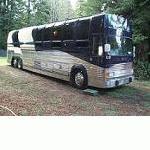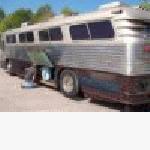| Author | Message | ||
| David Evans (Dmd)
Registered Member Username: Dmd Post Number: 403 Registered: 10-2004 Posted From: 173.77.206.109  Rating: N/A |
Just wondering if anyone has a good source of propane tanks. I need horizontal as our bays are shallow. Had a 75-100lb one that took up most of the bay and i felt like we were carrying a nuculear device. It came with the bus in 96, was old then and has the old valve. Found a online supplier in Phoenix that has a 40 gal horozontal for 199. includes shipping. I am guessing i could find some better deals in Florida when we get there after christmas. Any ideas how long a 40 lb would last running a 40,000 btu furnace and a stove? We never ever ran out with the atom bomb tank. Thanks in advance. ( i am posting this late so Bill wont see this and tease me about freezing in the bus. Its been 10 years since he gave me some of the best advice i have got and it was at Jacks first rally.) | ||
| Tom Christman (Tchristman)
Registered Member Username: Tchristman Post Number: 157 Registered: 1-2006 Posted From: 66.218.33.156 Rating: |
1 pound of propane = 21,591btu. So a 40,000btu furnace running all the time could run nearly 22 hours. Check with Manchester Tank. Good Luck, TomC | ||
| doug yes (Dougg)
Registered Member Username: Dougg Post Number: 114 Registered: 1-2007 Posted From: 125.24.27.182 Rating: N/A |
A 40 ib. will work fine in the south, but if you are boondocking up north in the winter, a 100 lb will be much better. We were in Chicago one Christmas and our 100 lb tank made a big difference. | ||
| John & Barb Tesser (Bigrigger)
Registered Member Username: Bigrigger Post Number: 317 Registered: 9-2007 Posted From: 24.183.21.246  Rating: N/A |
I kinda like having the smaller "available anywhere" 20 pound tanks. I have two in the hookup and carry an extra. That way I can just trade at any convienence store and not find a propane filling station. | ||
| Jim Wilke (Jim Bob) (Pd41044039)
Registered Member Username: Pd41044039 Post Number: 430 Registered: 2-2001 Posted From: 184.0.0.219 Rating: N/A |
I use the 20lb tanks too though my use has been in the South. I have just one connected and one in reserve. With them I don't have to move the bus to fill, can just throw them in the toad. There's a guy up here (NC mountains) who stays all winter in a motorhome. He had the gas company set a 100lb tank next to the MH & run a hose to the connection. By the way, if you are using a lot of propane in one place: it's priced way lower when the propane company comes & fills your tank than when you go to them with portable tanks. Something about residential heating rate. | ||
| john degemis (Degemis)
Registered Member Username: Degemis Post Number: 88 Registered: 3-2008 Posted From: 66.189.153.217  Rating: N/A |
I have 2 40lbs tanks with a auto switch over. They are just the right size for staning up in the bay. There is around a foot of clearance for easy in and out and plumbing.I put mine in the area where the ac was. it is 90% open out the bottom and the door is vented. so if there is a leek it will flow out. I could put 8 tanks in that space. If I wanted | ||
| Len Silva (Lsilva)
Registered Member Username: Lsilva Post Number: 335 Registered: 12-2000 Posted From: 72.187.35.208  Rating: N/A |
Years ago I lived on the road in a 28' travel trailer, all over the country. In the winter I would do just as Jim mentioned, call a local gas company to set a couple of hundred pounders. Much cheaper that way. A 20 would only last a couple of days in cold weather and ALWAYS runs out art 2:00 AM. Are you talking about 40 pounds or 40 gallons? A 20 pound tank is about 4-1/5 gallons. | ||
| David Evans (Dmd)
Registered Member Username: Dmd Post Number: 404 Registered: 10-2004 Posted From: 173.77.206.109  Rating: N/A |
Thanks everyone, it is 40 lbs and is a horizontal steel tank. I think i will go with the 20 lbs tank for the run south since it will be the cheepest route for now as i have some.How are these tanks date coded? Is it like scuba tanks with a 5 year recert? Just wondering in case i stumble on some used ones. Hope to see everyone in Florida, looks like shove off will have to be the 28th and that is weather depending. Oh boy! | ||
| Bill Gerrie (Bill_gerrie)
Registered Member Username: Bill_gerrie Post Number: 320 Registered: 3-2006 Posted From: 216.198.139.38 Rating: N/A |
David Look for a Manchester Tank as it is frame mounted and doesn't outdate. Not like bottles that outdate in 10 years here. I know you can't just pull the tank out to refill but best choice in the long run. Bill | ||
| Sean Welsh (Sean)
Registered Member Username: Sean Post Number: 992 Registered: 1-2003 Posted From: 72.171.0.141  Rating: N/A |
DOT LP cylinders must be recertified every 12 years. -Sean http://OurOdyssey.BlogSpot.com | ||
| Jim Wilke (Jim Bob) (Pd41044039)
Registered Member Username: Pd41044039 Post Number: 431 Registered: 2-2001 Posted From: 184.0.0.219 Rating: N/A |
The frame mounted tanks are not required to be recertified, per the gas company. I have a frame tank as well. I took mine out & had them inspect and replace the valve about 8 years ago but have never used or filled it since. The portables (DOT tanks) do have to be recertified as Sean says after 12 years on new tanks, 5 years on rehab or converted tanks. But I just trade them in to Blue Rhino (or whoever is exchanging tanks in a cage.) when they get too old. They charge you now but it's cheaper to trade than buy new tanks. If you look for used tanks with the triangular valve handle those probably will be young enough but check the dates. They will have one or more dates (if they have been rehabilitated by a gas company) and it's 5 years from the retest date or 12 years on a new tank. | ||
| ED Hackenbruch (Shadowman)
Registered Member Username: Shadowman Post Number: 209 Registered: 11-2003 Posted From: 70.210.176.151 Rating: N/A |
Len, we lived in a 33 ft. travel trailer in western Wa. for almost 3 years, and 80% of the time when we ran out of propane at 2am it was also cold and raining. Not a lot of fun changing tanks in those conditions. :>) | ||
| Sean Welsh (Sean)
Registered Member Username: Sean Post Number: 993 Registered: 1-2003 Posted From: 67.142.130.14  Rating: |
Bill, Manchester Tank makes DOT cylinders as well as ANSI tanks. The DOT cylinders expire in 12 years, just like everyone else's. Likewise, ANSI tanks are made by several manufacturers; Manchester is not necessarily any better than the other top brands. FWIW, a "cylinder" is portable, has a threaded connector for a hose, and must be approved by DOT to be carried in or on a vehicle. A "tank" is permanently mounted, has a permanent connection to the regulator, and is generally rated according to ANSI specifications. So BBQ grills and travel trailers use "cylinders," not "tanks," whereas motor homes generally use tanks, but may optionally use cylinders. We use two 11-pound (~2.5 gallon) pony cylinders aboard Odyssey, strictly for cooking. They last 4-6 months. Our fridge is 24-volt, and our heat and hot water is diesel, which costs much less per BTU than LPG. Our cylinders, BTW, are made by Manchester Tank. -Sean http://OurOdyssey.BlogSpot.com | ||
| Jim Wilkerson (Wagwar)
Registered Member Username: Wagwar Post Number: 3 Registered: 12-2009 Posted From: 149.173.6.50 Rating: N/A |
Sean, What system do you use for your diesel heat and hot water? Does this also provide preheat for the engine? How does the diesel bus heat work? Is it a hot water circulation process? Thanks! Jim | ||
| Sean Welsh (Sean)
Registered Member Username: Sean Post Number: 994 Registered: 1-2003 Posted From: 67.142.130.37  Rating: N/A |
Jim, We use a hydronic heating system. When parked, the heat is provided by a Webasto DBW-2010 diesel-fired boiler rated at 45,000 BTU/hr. When under way, we use waste heat from the engine, which is accessed via a heat exchanger in the engine and hydronic loops. A small electric pump in the engine cooling circuit allows that same heat exchanger to pre-heat the engine using heat provided by the Webasto. We chose this because we did not want to carry large amounts of LPG for safety reasons as well as bridge and tunnel access, and because we already had a large on-board diesel supply (350 gallon tank). I have hour meters on the Webasto and the generator, and we apply for a refund of the federal road tax paid on the diesel we burn in those annually. The two pony tanks of LP are strictly for the two-burner stove and the swing-out BBQ grill. If I had it to do over again, I would have no LP at all, choosing instead to install a two-burner induction stove. The BBQ could be charcoal or just use camp cylinders, and there are even electric models now that can run off the genny. -Sean http://OurOdyssey.BlogSpot.com | ||
| Jim Wilkerson (Wagwar)
Registered Member Username: Wagwar Post Number: 4 Registered: 12-2009 Posted From: 149.173.6.51 Rating: N/A |
Sean, Could you elaborate on the 'bridge and tunnel access'? BTW, I read the article in BCM this month featuring your bus and it is a gorgeous bus! You've done a fantastic job as well as very carefully designed and thought out. What does one of these Webasto units cost? Would it be difficult to retro-fit in a completed bus? Thanks! Jim | ||
| Tim Brandt (Timb)
Registered Member Username: Timb Post Number: 470 Registered: 10-2003 Posted From: 66.165.176.62  Rating: N/A |
Jim, Some tunnels etc prohibit the transport of propane tanks through them forcing you to take a not so direct route to get places. If I remember right Baltimore harbor tunnel is one of them | ||
| Sean Welsh (Sean)
Registered Member Username: Sean Post Number: 995 Registered: 1-2003 Posted From: 67.142.130.37  Rating: N/A |
Jim, Tim is correct on the LP restrictions. Our two tiny bottles are OK in the Baltimore tunnels, but verboten in the NYC tunnels, for example. Tanks the size of typical motorhome frame-mount units would prohibit you from the Baltimore tunnels, the Boston tunnels, and a host of others. There's always a way around, but it is often much longer. Some ferries also prohibit LPG or limit the size or quantity. I paid about $1,000 for my Webasto on eBay. They list for about twice that or so. Retrofiting the Webasto itself is probably not hard. More difficult would be running the hydronic lines throughout the coach. We used 3/4" silicone hoses, which are over 1" OD. If space is tight, 3/4 PEX can also be used, although you should still sweep the turns rather than use 90's. You'll probably have no trouble finding spots for the fan coil units. I will be covering hydronic systems at the BYOB workshop in Arcadia in January, after Bussin' 2010. -Sean http://OurOdyssey.BlogSpot.com | ||
| Jim Wilkerson (Wagwar)
Registered Member Username: Wagwar Post Number: 6 Registered: 12-2009 Posted From: 149.173.6.50 Rating: N/A |
Sean, What are the relative economies of propane (1 pound of propane = 21,591btu) vs. diesel? Is one significantly more 'efficient' than the other? It seems to me it may be easier to carry more diesel than propane. Jim | ||
| marvin pack (Gomer)
Registered Member Username: Gomer Post Number: 724 Registered: 3-2007 Posted From: 71.53.153.91  Rating: N/A |
Hey Sean!! Do you know when all the activities are to be starting at Jacks? I thought that he or someone else would post activities and most of all HOW TO GET THERE LOL Wanted to drive down and check you all out and see if you are as crazy as I am LOL Gomer | ||
| Bill Gerrie (Bill_gerrie)
Registered Member Username: Bill_gerrie Post Number: 321 Registered: 3-2006 Posted From: 216.198.139.38 Rating: N/A |
Sean When I said Manchester Tank I meant the propane container classed as a tank verses the one classed as a bottle. You are right about them making both versions. I have used propane on my coach for 25 years and never had a problem. You must exercise care and caution with propane use and keep a tight system but used properly it is very safe. Congratulations Sean on the BCM article. Very well done. You have a beautiful coach. The glass repair article is a good one for the busnuts to keep on file for just that time you get a stone chip. I had 5 on our trip out west and there is only one you can see now thanks to that same kit from Walmart. Bill | ||
| Sean Welsh (Sean)
Registered Member Username: Sean Post Number: 996 Registered: 1-2003 Posted From: 67.142.130.40  Rating: N/A |
Pure "propane" contains about 91,000 BTU per gallon. (There are 4.23 pounds per gallon of propane, which is where the 21,591 figure comes from.) HOWEVER, most of what is sold as "propane" in the US is not pure propane, but rather a mix known as "liquified petroleum gas" or LPG. LPG can be pure butane, pure propane, or a mix including either or both along with other simple hydrocarbons like pentane, hexane, etc.. The average BTU content of typical LPG in the US is closer to 86,000 BTU per gallon. By contrast, diesel fuel contains 139,000 BTU per gallon. Diesel is quite a bit denser than LPG, at 7.3 pounds per gallon, so on a per-pound basis, diesel contains less energy per pound at roughly 19,000 BTU. Since both diesel and LPG are sold by the gallon in the US rather than by the pound, and also since tankage is generally figured by volume, I find the per-gallon numbers easier to work with. Right now the average US retail price of diesel is $2.75 per gallon, and bulk propane is $2.35 per gallon, which makes diesel more cost effective (.0026 cents per BTU for propane vs. .0020 cents per BTU for diesel), assuming you'd even find retail propane as cheap as $2.35 per gallon on the road. As far as efficiency, that really is a function of the furnace or boiler you are using, rather than the specific fuel. That being said, safety considerations with LPG require more ventilation for burners, which generally sends a higher proportion of the heat up the flue with the waste gases than with comparable diesel units. We have found with our Webasto that the vast majority of the inherent energy in each gallon of diesel is converted directly to usable heat; very little is wasted in the exhaust.
Sorry, I don't. I expect he will be posting a schedule shortly. Getting there is easy; just Google Turner Agri-Civic Center in Arcadia. -Sean http://OurOdyssey.BlogSpot.com |